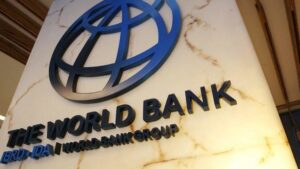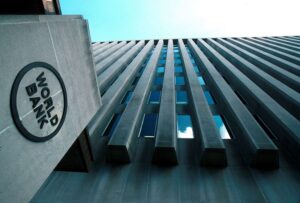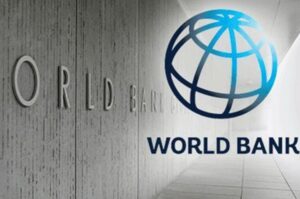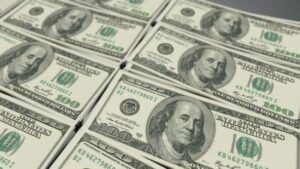
The World Bank’s Board of Directors on Saturday night in Kiev approved a new $432 million support package “Building Resilient Infrastructure in a Vulnerable Environment in Ukraine (DRIVE)” aimed at helping the government improve the resilience of the national road network and operational efficiency in the transport sector.
The Bank told Interfax-Ukraine that DRIVE complements the existing project “Rehabilitation of Essential Logistics Infrastructure and Network Connectivity (RELINC)”, under which modular road bridges were delivered and 200 flatcars were manufactured to increase Ukrzaliznytsia’s freight capacity and export capability.
The World Bank noted that Ukraine’s transportation infrastructure has suffered significant damage since the war began in February 2022, disrupting key import and export routes. According to the recently published Rapid Damage and Recovery Needs Assessment (RDNA4), road infrastructure in the transport sector has suffered the most damage: 58% of the transport sector; 30% of state roads and bridges, 11% of local roads and bridges, and 17% of municipal roads suffered significant damage.
DRIVE financing includes a $212 million loan from the International Bank for Reconstruction and Development (IBRD) under the ADVANCE Ukraine (ADVANCE Ukraine) Trust Fund, which was supported by the Government of Japan. The financing also includes a $210 million loan from the Special Program for the Recovery of Ukraine and Moldova (SPUR) and a $10 million grant from the Ukraine Support, Recovery, Rehabilitation and Reform Trust Fund (URTF).
The project will be implemented by the State Agency for Infrastructure Rehabilitation and Development of Ukraine.
The project page on the Bank’s website notes that it has three components, the first of which is the preservation of the national road network. This component includes two components. The first, a $270.48 million investment for national roads, finances the design, execution, and supervision of construction works aimed at maintaining certain sections of national roads in proper operational condition, including through operational maintenance, major road repairs, and major bridge repairs.
The second component, National Roads and Road Transport Reform, allocates $90 million for transportation sector performance with a results-based approach.
The second component for $39 million is periodic maintenance of the national road network, it also has two components: installation of emergency modular road bridges and climate-smart preservation of key links in the road network.
The third component is technical assistance and project management, which also has two components: technical assistance and project development ($9 million URTF grant), which complements the investment-oriented components, and project management ($1 million URTF grant), which finances eligible costs for implementation and project management support, training, and knowledge sharing.

Ukraine’s state budget has received $235 million in concessional financing from the Government of Japan under the World Bank’s new systemic projects, the Resilient, Inclusive and Environmentally Balanced Enterprise (RISE) and the Increasing Access to and Resilience of Education in Crisis-affected Ukraine (LEARN).
As the Ministry of Finance reported in a press release on Wednesday, the RISE program received a $130 million loan that will be used to address critical issues that hinder the growth and sustainable development of the private sector.
The Ministry clarified that the $105 million in Japanese funds received under the LEARN project is the result of the Ukrainian government’s implementation of measures to ensure safe face-to-face learning in schools by providing subventions for shelters and school buses in 2024.
The projects are implemented using the Program-for-results (PforR) financial instrument, when funds are allocated after Ukraine has achieved some of the results.
The Ministry of Finance noted that by the end of 2024, Ukraine expects to raise another $120 million and $95 million under RISE and LEARN, respectively.

The World Bank’s Board of Directors has approved a new $415 million systemic project in Ukraine, “Making Education Accessible and Resilient in the Face of Crisis in Ukraine” (LEARN), aimed at improving primary and secondary education in Ukraine, which will reach one million students, teachers, and school staff.
“It is crucial to mitigate the impact of war on children, especially those from the most vulnerable families, by minimizing disruptions to the learning process,” Bob Sohm, World Bank Regional Director for Eastern Europe, said in a release on Saturday night.
It is specified that the LEARN program provides for measures aimed at improving general security conditions in schools, providing free transportation for vulnerable students, teacher training, textbook procurement, and improving governance in the education sector. The project also aims to help implement a comprehensive education reform in grades 1-12 known as the New Ukrainian School (NUS), which meets EU standards, the WB said.
“The LEARN project will help thousands of Ukrainian students return to protected learning environments,” Finance Minister Sergii Marchenko said in the release.
It is specified that the project is being implemented using the financial instrument “Program-for-results” (PforR).
The Ministry of Finance notes that LEARN is aimed at improving the conditions for teaching and learning, which are implemented through subventions from the state budget to local budgets.
The WB notes that the initial funding for the LEARN program includes $235 million from the International Bank for Reconstruction and Development’s (IBRD) Assistance for Ukraine’s Necessary Credit Support (ADVANCE Ukraine) Trust Fund, $150 million from the International Development Association’s (IDA) Special Program for the Recovery of Ukraine and Moldova, and $30 million from the Ukraine Recovery, Rehabilitation, and Transformation Trust Fund (URTF). The program provides for results-based financing that can be scaled up as additional funds become available.
According to the release of the Ministry of Finance, the project agreement is expected to be signed in September 2024, and by the end of 2024, based on the achievement of pre-defined indicators, Ukraine will be able to receive $200 million to the general fund of the state budget.
The responsible executor of the PforR LEARN project in terms of supervision and coordination is the Ministry of Finance of Ukraine. At the same time, the Ministry of Education and Science of Ukraine has been designated as the lead implementing agency, which will be responsible for the implementation of the LEARN project, its monitoring and evaluation.

The World Bank Board of Directors has approved a new $415 million systemic project in Ukraine, “Making Education Accessible and Resilient in Ukraine’s Crisis (LEARN),” aimed at improving primary and secondary education in Ukraine, reaching one million students, teachers, and school staff.
“It is critical to mitigate the impact of war on children, especially those from the most vulnerable families, by minimizing disruption to the learning process,” World Bank Regional Director for Eastern Europe Bob Soma was quoted as saying in a World Bank release on Saturday night.
It is specified that the LEARN programs include measures aimed at improving overall school safety conditions, providing free transportation for vulnerable students, conducting teacher training, purchasing textbooks and improving governance in the education sector. The project also aims to help implement a comprehensive education reform in grades 1-12, known as the New Ukrainian School (NUS), which is aligned with EU standards, the WB pointed out.
“The LEARN project will help thousands of Ukrainian students return to a protected learning environment,” Finance Minister Serhiy Marchenko was quoted as saying in the release.
It is specified that the project is implemented using the financial instrument “Program-for-results, Program-for-results” (PforR).
The Ministry of Finance notes that LEARN is aimed at improving conditions for teaching and learning, implemented at the expense of subventions from the state budget to local budgets.
The WB notes that initial funding for the LEARN program includes $235 million from the International Bank for Reconstruction and Development’s (IBRD) ADVANCE Ukraine Trust Fund, $150 million from the International Development Association’s (IDA) Special Program for the Reconstruction of Ukraine and Moldova, and $30 million from the Ukraine Support, Recovery, Rehabilitation and Reform Trust Fund (URTF). The program provides results-based financing that can be scaled up if additional funds are available.

Ukraine’s state budget has received about $390 million from Japan as part of World Bank projects aimed at social protection and agricultural recovery, the Ministry of Finance said in a statement on Wednesday evening.
According to the report, Japan’s financial assistance in January consists of a $89.8 million grant under the Emergency Project for Inclusive Support for Ukraine’s Agricultural Recovery (ARISE) and a $300 million loan under the Investing in Social Protection to Improve Coverage, Resilience, and Efficiency (INSPIRE) project.
“I am grateful to the World Bank and the Government of Japan for their strong financial support for Ukraine. The funds raised will be used to reimburse the expenditures of the state budget of Ukraine for priority needs, in particular in the field of recovery and social assistance,” Finance Minister Sergii Marchenko said in a release.
The Ministry of Finance reminded that the INSPIRE project is funded by a $1.2 billion loan from the World Bank from the Trust Fund for the Provision of Necessary Credit Support to Ukraine (ADVANCE Ukraine) with the support of the Government of Japan and aims to ensure social protection of vulnerable populations during and after the war, as well as to strengthen the adaptability of the social support system to effectively respond to current and future challenges.
The ARISE project aims to support agricultural producers’ access to finance through concessional lending and grants.

The National Bank of Ukraine (NBU) together with international partners, in particular the World Bank and the European Bank for Reconstruction and Development (EBRD), are preparing a new mechanism for settling military risks, which they plan to present no later than the first quarter of 2024.
As noted on the NBU Facebook page, during the meeting of the regulator’s management with participants of the insurance market, the head of the National Bank Andriy Pyshnyy emphasized the importance of the introduction of insurance of political-military risks, which should be fully operational next year.
It was also noted that one of the priorities of the National Bank in 2024 is the development of a competitive, adaptive and cost-effective insurance market.
“New requirements for insurance companies bring us closer to European standards of regulation and supervision. Therefore, the implementation of new norms is a priority, and integration into the European community is task No. 1. We will have to move as fast as possible, but you can count on comprehensive support and mature constructive dialog,” Pyshny said, speaking about the importance of such changes for domestic insurance.
It was noted that in 2024, in particular, will begin the application of risk-oriented prudential supervision and improvement of requirements for the solvency of insurers, as well as a new type of supervision of market behavior of insurers to control compliance with the rules and standards of financial services.
“The National Bank is strengthening its staff with specialists who will evaluate insurers’ business models using a risk-based approach. Special attention will be paid to the assessment of insurers’ assets – property and securities, the value of which should be market-based,” Deputy Head of the NBU Dmytro Oleinik said during the meeting.
Separately, emphasis was placed on the importance of the work of financial monitoring units of insurers as a safeguard to attract companies to money laundering schemes, in particular for the purpose of tax evasion, and to limit ties with Russia.
At the same time, it was noted that the work continues in the Parliament to finalize the text of the new law “On compulsory insurance of civil liability of owners of land vehicles,” which should be adopted under the IMF program by the end of May next year.
Now insurance companies will have to prepare for the renewed field inspections by the National Bank in order to eliminate possible violations of the law in advance, emphasized representatives of the regulator.
Andriy Pyshnyy, EBRD, European Bank for Reconstruction and Development, NATIONAL BANK OF UKRAINE, NBU, WORLD BANK